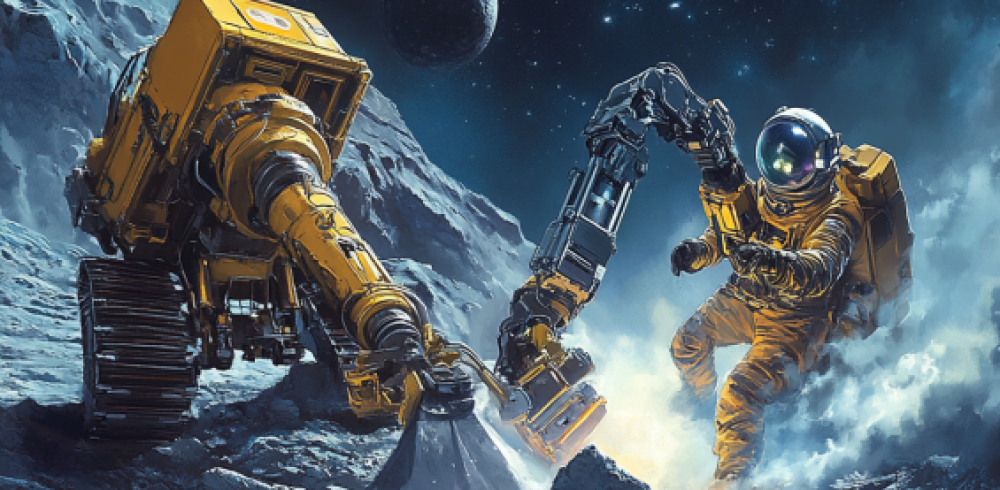~ Top Jobs in the Planetary Mining Industry ~
With the rapid development of space technology, the concept of mining in space is moving from science fiction to reality. Pacific Precious Metals has released insights into the types of jobs future generations may see in the emerging industry of space mining. With new technology enabling exploration beyond Earth, today’s children might one day pursue careers as space miners, planetary engineers, or even environmental specialists focused on preserving space environments.
Dan Barrett, Marketing Director at Pacific Precious Metals, notes, “The space mining industry could open up a whole new frontier for careers, requiring unique skill sets and perspectives. Just as our ancestors couldn’t have imagined today’s tech jobs, we’re envisioning what future roles could look like for space exploration.”
Future Careers in Planetary Mining
Here’s a look at some of the careers that may become essential in the field of space mining:
Asteroid Miner
Role: Asteroid miners will extract metals, minerals, and water ice from asteroids using advanced robotics and spacecraft. These miners would focus on gathering elements rare on Earth, such as platinum, which could be used in manufacturing and technology.
Skills Needed: Skills in robotic technology, mining systems, and basic geology, combined with a solid understanding of spacecraft operation and space safety procedures.
Did You Know?: NASA and private companies are already investing in technology to explore and potentially mine nearby asteroids.
Planetary Geologist
Role: Planetary geologists will study the composition of other planets and moons to pinpoint areas rich in minerals and resources, essential for both mining and scientific exploration.
Skills Needed: Backgrounds in geology, chemistry, and planetary science, along with proficiency in robotic equipment and data analysis from remote sensors.
Did You Know?: Today’s planetary geologists primarily study space from afar, but future generations may work directly on Mars or the Moon.
Space Station Engineer
Role: These engineers will design, maintain, and operate bases on planets or asteroids, ensuring that life support systems, mining equipment, and infrastructure remain functional.
Skills Needed: Expertise in mechanical and electrical engineering, with specific knowledge of space systems, robotics, and sustainable design to handle the challenges of otherworldly environments.
Did You Know?: Space stations on asteroids or the Moon could serve as mining hubs, and space engineers will be the essential personnel keeping these facilities operational.
Space Logistics Coordinator
Role: Space logistics coordinators will be responsible for managing the transportation of mined materials from space back to Earth, or between space stations, ensuring the timely and safe delivery of resources.
Skills Needed: Strong organizational skills, knowledge of supply chain management, and an understanding of spacecraft operations and international space law.
Did You Know?: Effective logistics will be critical to making space mining financially viable, as transporting resources will require precise planning.
Space Environmental Specialist
Role: These specialists will work on minimizing environmental impacts of mining activities, both in space and on Earth, helping ensure sustainable and responsible practices.
Skills Needed: Expertise in environmental science, planetary ecosystems, and space policy, with an understanding of how to implement sustainable practices in new environments.
Did You Know?: As space mining grows, regulations around planetary protection and sustainability will be needed, and specialists in this field will be key to developing these standards.
Preparing the Next Generation for Space Mining
Future space miners will need specialized skills and education. Areas of study like robotics, planetary science, geology, and aerospace engineering will be crucial. Soft skills, such as adaptability and creative problem-solving, will be just as important, as workers in space mining must handle unforeseen challenges in unpredictable environments.
Education and Training: Advanced degrees in fields like astrophysics, environmental science, and engineering are likely to be required. Additionally, hands-on training programs for space-specific conditions, such as zero-gravity operations and robotic system maintenance, will prepare future space miners for the unique demands of interplanetary work.
“Space mining isn’t just a dream—it’s a near-future reality,” Barrett continues. “Children growing up today may enter an industry that takes humanity beyond Earth, discovering resources that could change our world and fuel future exploration.”
Impact on Daily Life
Beyond providing new jobs, space mining could impact daily life on Earth. From supplying materials for new technologies to offering sustainable energy sources, the industry holds the potential to transform our economies and even reduce costs for everyday products.
Manufacturing & Engineering Magazine | The Home of Manufacturing Industry News









